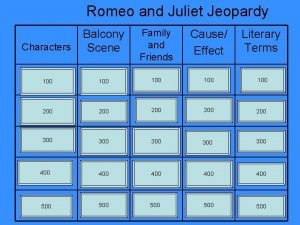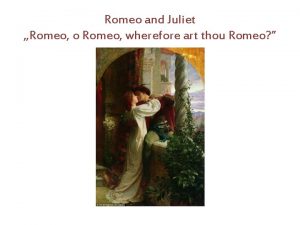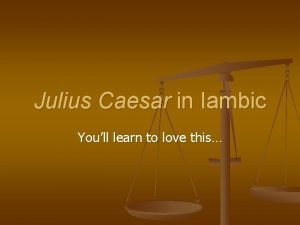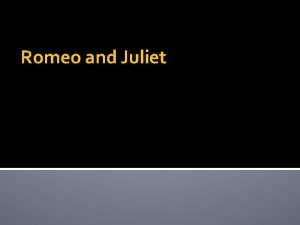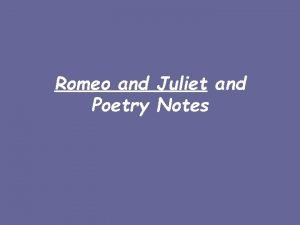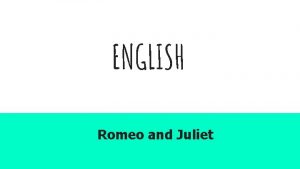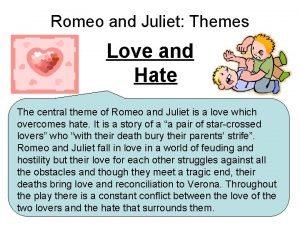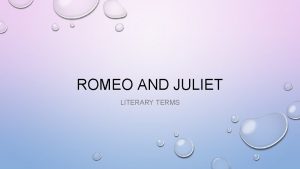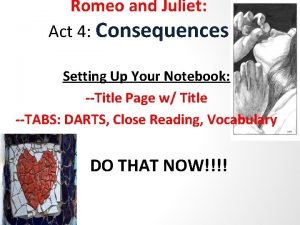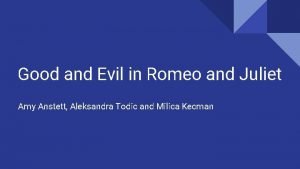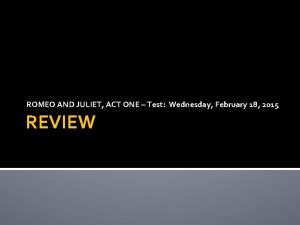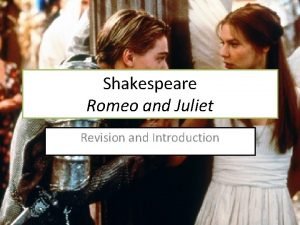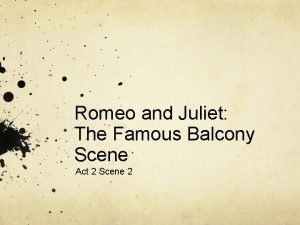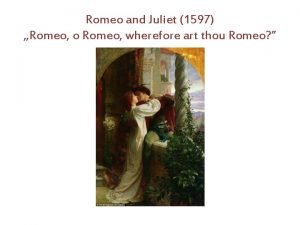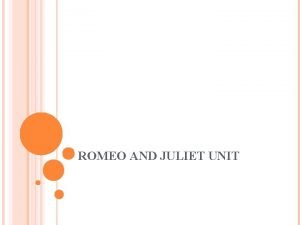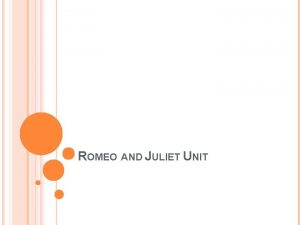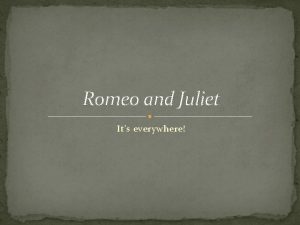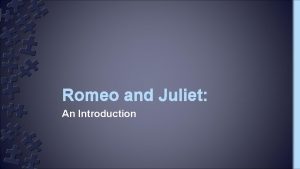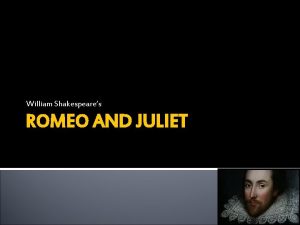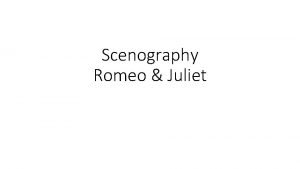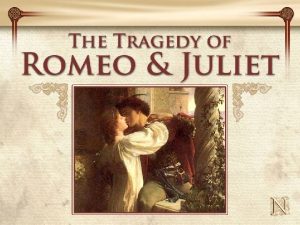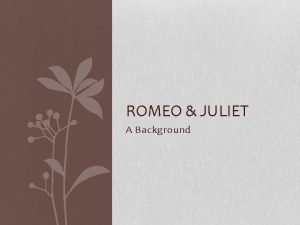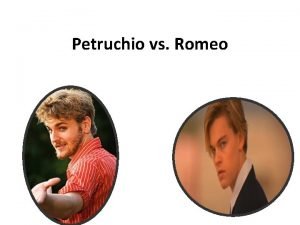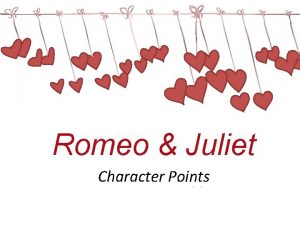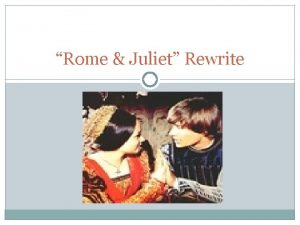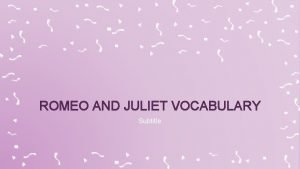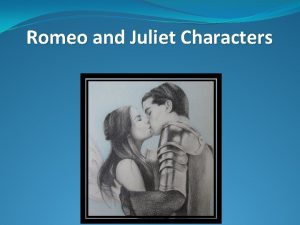Romeo and Juliet Romeo o Romeo wherefore art




![Scene II. Capulet's Garden. [Enter Romeo. ] Romeo. He jests at scars that never Scene II. Capulet's Garden. [Enter Romeo. ] Romeo. He jests at scars that never](https://slidetodoc.com/presentation_image/5ea0eac45454ccc2c1928e401b0721ea/image-5.jpg)












- Slides: 17

Romeo and Juliet „Romeo, o Romeo, wherefore art thou Romeo? ”

Sources In antiquity --Ovid’s Metamorphoses Pyramus and Thisbe --Xenophon of Ephesus Ephesiaca --the names Montague and Capulet in Dante’s Divine Comedy Three contemporary Italian sources: --Giulietta e Romeo, a novella by the Italian author Matteo Bandello, written in 1554 --a story in a collection called Il Novellio, by the widely-popular fifteenth-century writer Masuccio Salernitano --the Historia Novellamente Ritrovata di Due Nobili Amanti or A Story Newly Found of two Noble Lovers, written by Luigi Da Porto and published in 1530.

Contemporary English sources --a poem by Arthur Brooke called The Tragicall Historye of Romeus and Iuliet, 1562 --the popular tale of Romeo and Juliet from a collection by William Painter, entitled The Palace of Pleasure, 1580 Shakespeare’s version was published in 1599

Cast of characters House of Verona § Prince of Verona (Escalus) § Count Paris § Mercutio (friend of Romeo) Montagues § Lord and Lady Montague § Romeo § Benvolio Capulets § Lord and Lady Capulet § Juliet § Tybalt § Nurse Friar Laurence
![Scene II Capulets Garden Enter Romeo Romeo He jests at scars that never Scene II. Capulet's Garden. [Enter Romeo. ] Romeo. He jests at scars that never](https://slidetodoc.com/presentation_image/5ea0eac45454ccc2c1928e401b0721ea/image-5.jpg)
Scene II. Capulet's Garden. [Enter Romeo. ] Romeo. He jests at scars that never felt a wound. [Juliet appears above at a window. ] But soft, what light through yonder window breaks? It is the east and Juliet is the sun! Arise, fair sun, and kill the envious moon, Who is already sick and pale with grief That thou her maid art far more fair than she. Be not her maid, since she is envious; Her vestal livery is but sick and green, And none but fools do wear it. Cast it off. It is my lady, O, it is my love! (10) O that she knew she were!

She speaks, yet she says nothing; what of that? Her eye discourses, I will answer it. I am too bold: 'tis not to me she speaks. Two of the fairest stars in all the heaven, Having some business, do entreat her eyes To twinkle in their spheres till they return. What if her eyes were there, they in her head? The brightness of her cheek would shame those stars, As daylight doth a lamp. Her eyes in heaven (20) Would through the airy region stream so bright That birds would sing and think it were not night. See how she leans her cheek upon her hand O that I were a glove upon that hand, That I might touch that cheek!

Juliet. Ay me! Romeo. She speaks. O, speak again, bright angel, for thou art As glorious to this night, being o'er my head, As is a winged messenger of heaven (30) Unto the white-upturned wondering eyes Of mortals that fall back to gaze on him When he bestrides the lazy-puffing clouds And sails upon the bosom of the air. Juliet. O Romeo, Romeo! wherefore art thou Romeo? Deny thy father and refuse thy name; Or, if thou wilt not, be but sworn my love, And I'll no longer be a Capulet.

Gallop apace, you fiery-footed steeds, Towards Phoebus' lodging! Such a wagoner As Phaeton would whip you to the West And bring in cloudy night immediately. Spread thy close curtain, love-performing night, That runaway eyes may wink, and Romeo Leap to these arms untalk'd of and unseen. Lovers can see to do their amorous rites By their own beauties; or, if love be blind, It best agrees with night. Come, civil night, Thou sober-suited matron, all in black, And learn me how to lose a winning match, Play'd for a pair of stainless maidenhoods. Hood my unmann'd blood, bating in my cheeks,

With thy black mantle till strange love, grown bold, Think true love acted simple modesty. Come, night; come, Romeo; come, thou day in night; For thou wilt lie upon the wings of night Whiter than new snow upon a raven's back. Come, gentle night; come, loving, black-brow'd night; Give me my Romeo; and, when he shall die, Take him and cut him out in little stars, And he will make the face of heaven so fine That all the world will be in love with night And pay no worship to the garish sun. O, I have bought the mansion of a love, But not possess'd it; and though I am sold, Not yet enjoy'd. So tedious is this day As is the night before some festival To an impatient child that hath new robes And may not wear them. –Act III, Scene II

Shall I speak ill of him that is my husband? Ah, poor my lord, what tongue shall smooth thy name When I, thy three-hours wife, have mangled it? But wherefore, villain, didst thou kill my cousin? That villain cousin would have kill'd my husband. Back, foolish tears, back to your native spring! Your tributary drops belong to woe, Which you, mistaking, offer up to joy. My husband lives, that Tybalt would have slain; And Tybalt's dead, that would have slain my husband. All this is comfort; wherefore weep I then? Some word there was, worser than Tybalt's death, That murd'red me. I would forget it fain; But O, it presses to my memory Like damned guilty deeds to sinners' minds!

'Tybalt is dead, and Romeo- banished. ' That 'banished, ' that one word 'banished, ' Hath slain ten thousand Tybalts. Tybalt's death Was woe enough, if it had ended there; Or, if sour woe delights in fellowship And needly will be rank'd with other griefs, Why followed not, when she said 'Tybalt's dead, ' Thy father, or thy mother, nay, or both, Which modern lamentation might have mov'd? But with a rearward following Tybalt's death, 'Romeo is banished'- to speak that word Is father, mother, Tybalt, Romeo, Juliet, All slain, all dead. 'Romeo is banished'There is no end, no limit, measure, bound, In that word's death; no words can that woe sound. Where is my father and my mother, nurse? –Act III, Scene II

Friar: Hold thy desperate hand. Art thou a man? Thy form cries out thou art; Thy tears are womanish, thy wild acts denote The unreasonable fury of a beast. Unseemly woman in a seeming man! Or ill-beseeming beast in seeming both! Thou hast amaz'd me. By my holy order, I thought thy disposition better temper'd. Hast thou slain Tybalt? Wilt thou slay thyself? And slay thy lady that in thy life lives, By doing damned hate upon thyself? Why railest thou on thy birth, the heaven, and earth? Since birth and heaven and earth, all three do meet In thee at once; which thou at once wouldst lose. Fie, fie, thou shamest thy shape, thy love, thy wit, Which, like a usurer, abound'st in all, And usest none in that true use indeed Which should bedeck thy shape, thy love, thy wit.

Thy noble shape is but a form of wax Digressing from the valour of a man; Thy dear love sworn but hollow perjury, Killing that love which thou hast vow'd to cherish; Thy wit, that ornament to shape and love, Misshapen in the conduct of them both, Like powder in a skilless soldier's flask, is get afire by thine own ignorance, And thou dismemb'red with thine own defence. What, rouse thee, man! Thy Juliet is alive, For whose dear sake thou wast but lately dead. There art thou happy. Tybalt would kill thee, But thou slewest Tybalt. There art thou happy too. The law, that threat'ned death, becomes thy friend And turns it to exile. There art thou happy.

A pack of blessings light upon thy back; Happiness courts thee in her best array; But, like a misbhav'd and sullen wench, Thou pout'st upon thy fortune and thy love. Take heed, take heed, for such die miserable. Go get thee to thy love, as was decreed, Ascend her chamber, hence and comfort her. But look thou stay not till the watch be set, For then thou canst not pass to Mantua, Where thou shalt live till we can find a time To blaze your marriage, reconcile your friends, Beg pardon of the Prince, and call thee back With twenty hundred thousand times more joy Than thou went'st forth in lamentation. Go before, nurse. Commend me to thy lady, And bid her hasten all the house to bed, Which heavy sorrow makes them apt unto. Romeo is coming. –Act III, Scene III

How oft when men are at the point of death Have they been merry! which their keepers call A lightning before death. O, how may I Call this a lightning? O my love! my wife! Death, that hath suck'd the honey of thy breath, Hath had no power yet upon thy beauty. Thou art not conquer'd. Beauty's ensign yet Is crimson in thy lips and in thy cheeks, And death's pale flag is not advanced there. Tybalt, liest thou there in thy bloody sheet? O, what more favour can I do to thee Than with that hand that cut thy youth in twain To sunder his that was thine enemy?

Forgive me, cousin. ' Ah, dear Juliet, Why art thou yet so fair? Shall I believe That unsubstantial Death is amorous, And that the lean abhorred monster keeps Thee here in dark to be his paramour? For fear of that I still will stay with thee And never from this palace of dim night Depart again. Here, here will I remain With worms that are thy chambermaids. O, here Will I set up my everlasting rest And shake the yoke of inauspicious stars From this world-wearied flesh. Eyes, look your last! Arms, take your last embrace! and, lips, O you The doors of breath, seal with a righteous kiss A dateless bargain to engrossing death! Come, bitter conduct; come, unsavoury guide! Thou desperate pilot, now at once run on The dashing rocks thy seasick weary bark! Here's to my love! [Drinks. ] O true apothecary! Thy drugs are quick. Thus with a kiss I die. Falls. –Act V Scene III

„Catharsis’ there certainly is in Romeo and Juliet, however, in our feeling that the lovers, completing their union in death as they could not complete it in life, are at least safe; and in our feeling that such love as theirs, passionate and sexual though it was, was a dedication to a higher scale of values than obtained in the violent commerce of the worldly society they lived in. ” –Philip Edwards, The Oxford Illustrated History of English Literature, 138
 Who said o romeo romeo wherefore art thou romeo
Who said o romeo romeo wherefore art thou romeo Romeo and juliet family names
Romeo and juliet family names Who says hold thy desperate hand
Who says hold thy desperate hand Romeo romeo where art thou romeo
Romeo romeo where art thou romeo Iambic pentameter julius caesar
Iambic pentameter julius caesar Unhappy fortune by my brotherhood
Unhappy fortune by my brotherhood Romeo romeo where art thou romeo
Romeo romeo where art thou romeo Petruchio romeo and juliet
Petruchio romeo and juliet Act 1 scene 5 romeo and juliet quotes
Act 1 scene 5 romeo and juliet quotes Comparison chart romeo and juliet vs. west side story
Comparison chart romeo and juliet vs. west side story Theme of hatred in romeo and juliet
Theme of hatred in romeo and juliet Protagonist and antagonist in romeo and juliet
Protagonist and antagonist in romeo and juliet Summary of act 4 and 5 romeo and juliet
Summary of act 4 and 5 romeo and juliet Evil character
Evil character Romeo and juliet act one test
Romeo and juliet act one test Shakespeare similes
Shakespeare similes Historical context of romeo and juliet
Historical context of romeo and juliet Romeo and juliet balcony scene script
Romeo and juliet balcony scene script

